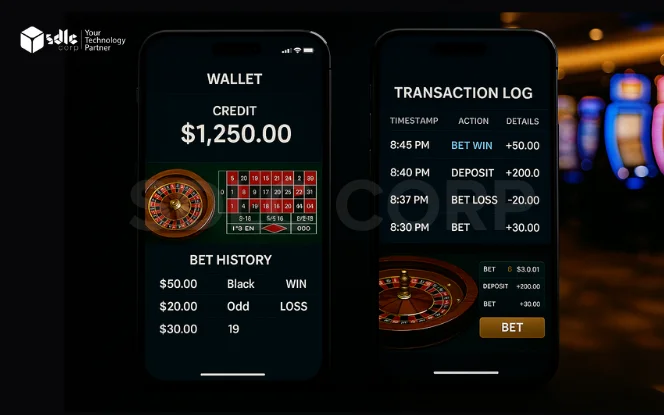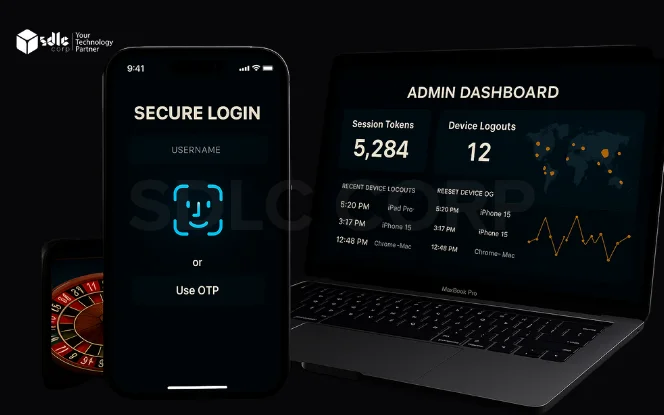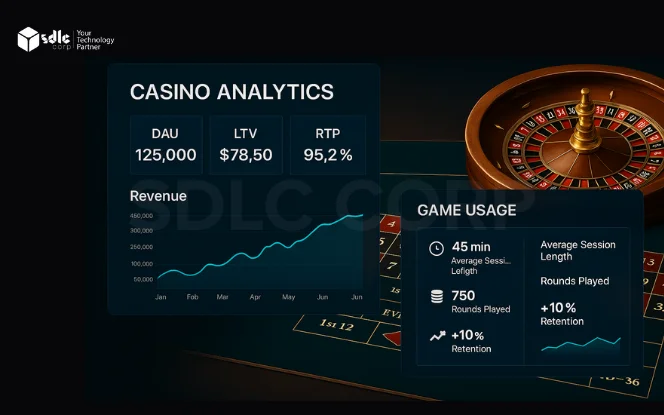Introduction
1. Monolith vs. Microservices: Choosing the Right Paradigm

Transitioning from a monolithic to a microservices-based architecture offers operational and scaling benefits.
Key Practices:
- Segment systems into services like authentication, payment, RNG, game logic, and analytics.
- Use Kubernetes for container orchestration and service isolation.
- Adopt gRPC for internal communication and REST for external APIs.
- Integrate service mesh tools like Istio or Linkerd.
Related reading: Designing a Scalable Casino Game Server Infrastructure
2. Random Number Generator (RNG) Service Design

An effective RNG service ensures fairness, determinism, and auditability.
Key Practices:
- Use cryptographically secure RNGs like Fortuna or ChaCha20.
- Combine client and server seeds for provably fair generation.
- Secure with HMAC-SHA256 hashing and hash verification.
- Implement periodic re-seeding using entropy sources.
- Anchor RNG logs on blockchain or tamper-evident storage.
3. Real-Time Game State Synchronization

State synchronization ensures smooth multiplayer interaction and fair gameplay.
Key Practices:
- Implement WebSockets or Socket.IO for persistent connections.
- Use Kafka or NATS for asynchronous game event propagation.
- Apply event sourcing or versioned state snapshots.
- Detect and resolve race conditions in concurrent environments.
- Introduce rollback mechanisms to correct inconsistencies.
Explore: Optimizing Casino Game Architecture for Low Latency
4. Scalable Wallet and Transaction Ledgering

Financial services must be atomic, auditable, and resilient.
Key Practices:
- Use two-phase commit or SAGA pattern for transaction coordination.
- Maintain an immutable, append-only ledger.
- Implement safeguards for double-spend prevention.
- Separate transaction processing from ledger write paths.
- Use distributed databases like CockroachDB or ScyllaDB.
Recommended: Choosing the Right Database for Casino Game Scaling
5. Anti-Fraud and Anomaly Detection Layer

An intelligent fraud detection layer is vital for fairness and operational integrity.
Key Practices:
- Analyze behavioral patterns such as bet timing and velocity.
- Deploy machine learning models for anomaly detection.
- Use Apache Flink for real-time stream processing.
- Collect IP, device fingerprints, and location metadata.
- Automate alerts and risk scoring systems for flagged behavior.
See More : Ensuring Security in Scalable Casino Game Architecture
6. Session Management and Security Hardening

Securing user sessions is essential for account integrity and compliance.
Key Practices:
- Implement OAuth2.0, JWT, or opaque tokens.
- Use Redis for secure, ephemeral session storage.
- Maintain load balancer affinity for session stickiness.
- Apply rate limiting, IP whitelisting, and GeoIP blocking.
- Log and audit session lifecycle events for traceability
7. High Availability and Disaster Recovery Architecture

Designing for failure is mandatory in high-stakes casino platforms.
Key Practices:
- Deploy services across multiple cloud regions and zones.
- Choose between active-active or active-passive DR setups.
- Integrate a global load balancer for automatic routing.
- Perform regular snapshots, backups, and replication.
- Conduct chaos engineering simulations to validate failover.
Learn more: Designing Multi-Region Casino Game Architectures
8. Regulatory Compliance and Auditing Systems

Compliance is mandatory for operating in regulated markets.
Key Practices:
- Store logs using WORM (Write Once Read Many) storage.
- Maintain timestamped audit trails of critical user and system actions.
- Stream logs into ELK stacks (Elasticsearch, Logstash, Kibana).
- Map system activities to GDPR, PCI-DSS, and ISO-27001 standards.
Provide sandboxed environments for audit replays and regulator reviews
9. Analytics and Business Intelligence Integration

Actionable data fuels growth, optimization, and retention.
Key Practices:
- Stream telemetry from all game services using Kafka or Pulsar.
- Store structured event data in Snowflake, ClickHouse, or BigQuery.
- Measure KPIs like RTP, DAU, LTV, and ARPU.
- Use Grafana, Metabase, or Superset for data visualization.
Feed predictive models for churn detection, bonus targeting, and player segmentation.
10. CI/CD and Observability at Scale

Efficient DevOps ensures continuous improvement with minimal risk.
Key Practices:
- Automate build/test/deploy workflows using GitHub Actions or GitLab CI.
- Use ArgoCD for declarative GitOps deployment and Argo Rollouts for canary releases.
- Collect metrics with Prometheus and visualize them via Grafana.
- Centralize logging using Loki, ELK, or Fluentd.
- Instrument all services with OpenTelemetry for distributed tracing and correlation.
Read more: Monitoring and Logging in Casino Game Architecture
Conclusion
The backend for casino games requires deep consideration of latency, fairness, financial reliability, and legal compliance. Adhering to these architectural best practices allows development teams to build platforms that are scalable, secure, auditable, and player-trusted.



